RELG 402 - World's Living Religions
Bahá'í
Images in the text are linked to larger photos - click on them to see the larger pictures.
Hover the mouse over the images to see their captions.
Bahá'í is a development of Islam, with its roots in the Shi'ite branch.
History :
In 1844 Siyyid `Alí Muhammad Shírází took the name of al-Báb (the Door, or the Mouth) and founded Babism in Shiraz, Persia (now Iran). He also claimed to be the (returning) Twelfth Imam of Shi'a Islam.
Part of al-Báb's teaching was that the Bahá'u'lláh would come as the religious leader to reform Islam - this provoked great persecution by the Moslem authorities.
The followers of the Báb were known as Bábís.
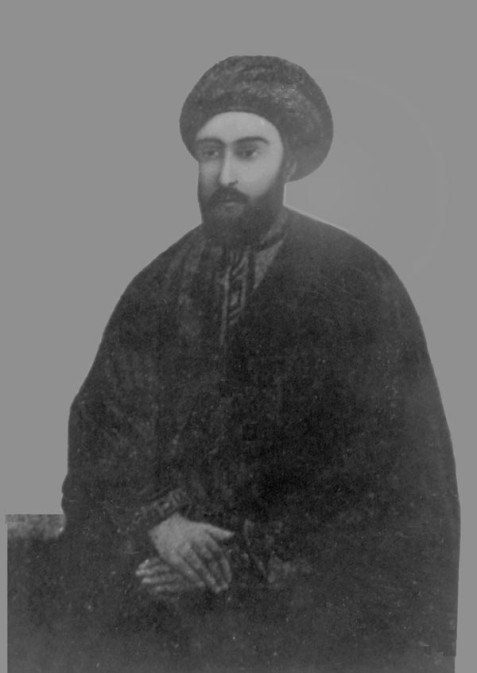 |
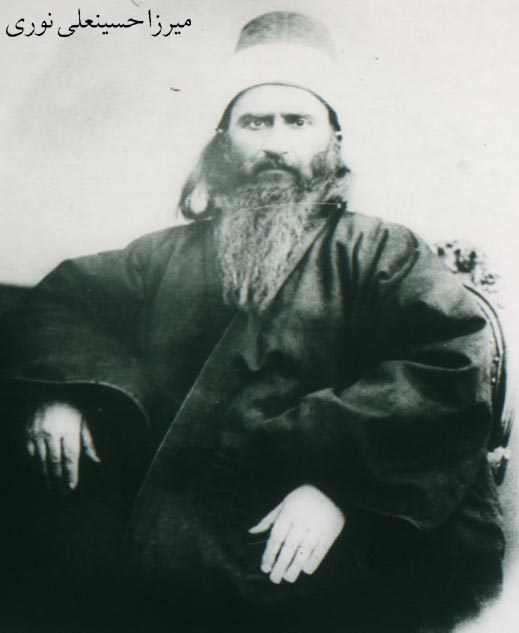 |
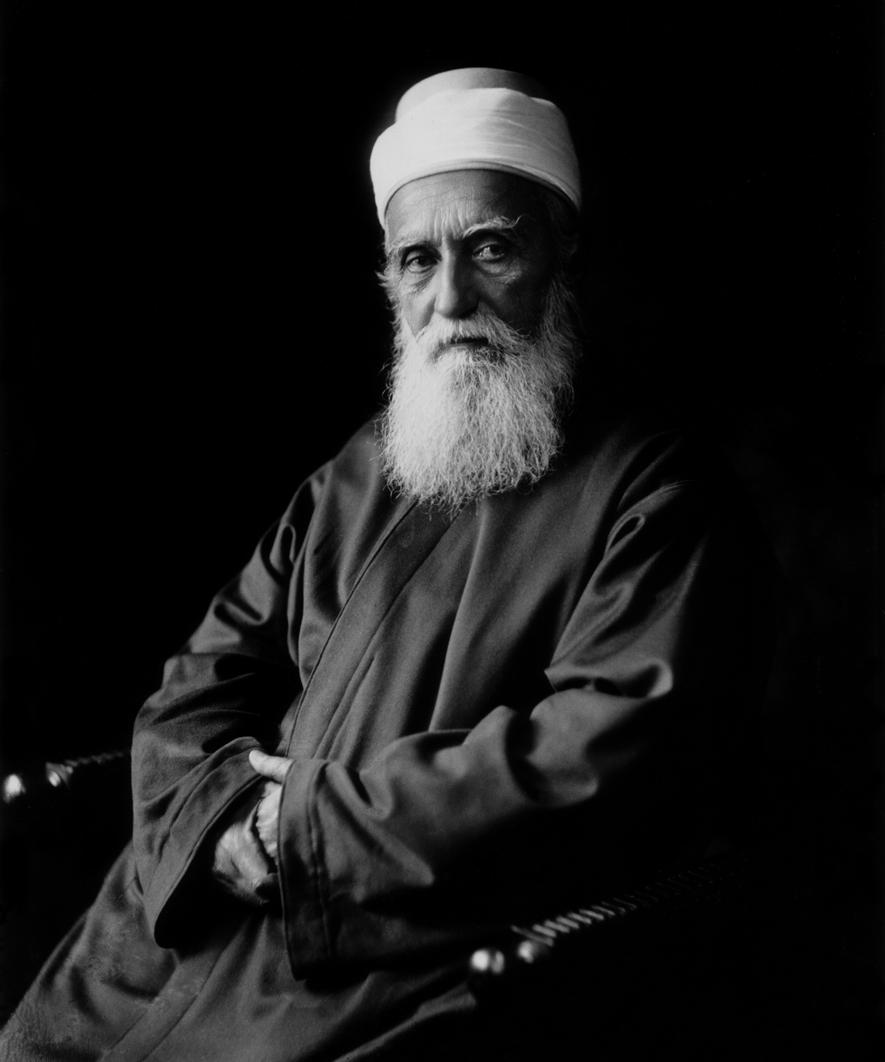 |
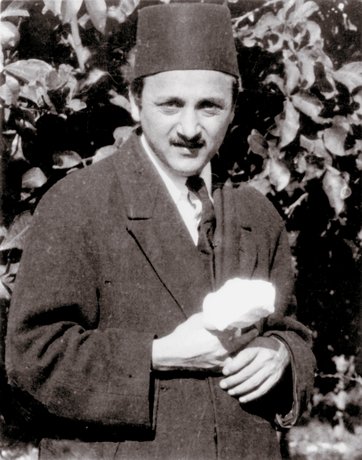 |
| The Bab | Baha'u'llah | `Abdu'l-Bahá | Shogi Effendi |
Babism developed into Bahá'í under the leadership of Mirza Husayn 'Ali Nuri, who took the name Baha'u'lláh (Glory of God) while in exile in Baghdad.
Baha'u'llah was an Iranian (Iran was then called Persia), and started out as a Shi'ite Muslim.
The Báb declared that Mirza Husayn Ali was the new prophet.
The Báb was imprisoned, and eventually executed in 1850 by the Muslim hierarchy because he said that another prophet was going to take the place of Mohammed. When he was about to be killed, he sent his writings to Baha'u'lláh.
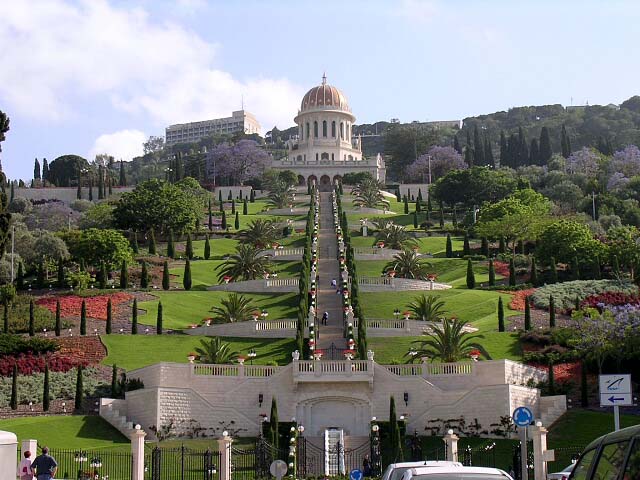
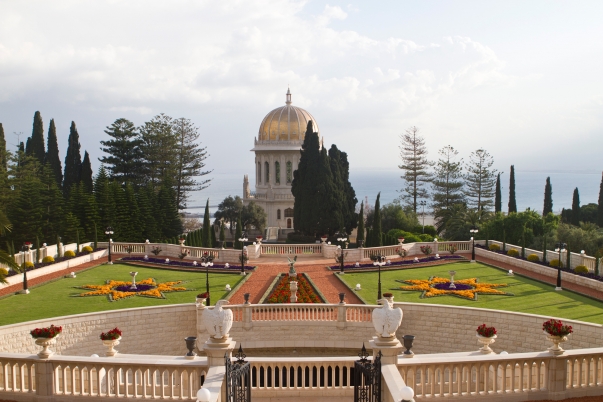 Bahá'ís believe that the Báb was a spiritual return of Elijah, John the Baptist, and one of the Zoroastrian spiritual figures. After his execution, his remains were thrown out of the city, but his followers collected them and brought them secretly by stages to Haifa in what is now Israel. In 1909 a special tomb was built at the foot of Mount Carmel, and this precinct is now the site of the Shrine of the Báb. Between 1949 and 1953 a Shrine was built over the tomb. The Shrine of the Báb has become one of the main shrines and places for pilgrimage for Bahá'ís.
Bahá'ís believe that the Báb was a spiritual return of Elijah, John the Baptist, and one of the Zoroastrian spiritual figures. After his execution, his remains were thrown out of the city, but his followers collected them and brought them secretly by stages to Haifa in what is now Israel. In 1909 a special tomb was built at the foot of Mount Carmel, and this precinct is now the site of the Shrine of the Báb. Between 1949 and 1953 a Shrine was built over the tomb. The Shrine of the Báb has become one of the main shrines and places for pilgrimage for Bahá'ís.
Baha'u'lláh was accused of taking part in the plot to kill the Shah of Persia, and was imprisoned in Tehran in 1852. While he was in prison he had a vision of the "Most Great Spirit" who confirmed his mission - this was in 1853. He was released from prison in 1853 and went into exile in Baghdad in Iraq. For the next several years he traveled as a hermit or dervish through the mountains of Kurdistan, then returned to Baghdad in 1856. The Ottoman authorities ordered him to move to Constantinople, then to Adrianople, where he spent much of his time writing to kings and rulers of the world, calling them to put away worldly possessions and rule with justice, to protect the rights of the oppressed. He called for a reduction in armaments, and told the Christian leaders to obey Jesus' call to follow the "Spirit of Truth".
In 1868 Baha'u'lláh was sentenced to imprisonment in Akka (now the town of Acre, on the outskirts of Haifa, on the Mediterranean coast of Israel). Here, he continued his campaign of writing to world rulers, announcing that he was a messenger of God. He wrote to Pope Pius IX, the Emperor Napoleon III of France, Tsar Alexander II of Russia, Queen Victoria of Britain, the Emperor Franz Joseph of Austria, and the President of the USA. Their replies are not on record.
Eventually the imprisonment was relaxed to house-arrest, but Baha'u'lláh remained a prisoner for the rest of his life. In 1892 he contracted a fever, from which he died within a few weeks. He was buried in the Shrine of the Baha'u'lláh by the house in which he died. The shrine and the gardens around it has become the most holy place for Bahá'is.
Baha'u'lláh died in 1892. He had appointed his son `Abdu'l-Bahá as the leader of the Bahá'is and "Center of the Covenant". "Head of the Faith" and interpreter of Baha'u'lláh's writings. `Abdu'l-Bahá was still in exile and prison with his father, and was not released until 1908. `Abdu'l-Bahá worked to spread the new religion to Europe and America, although there was still persecution in Persia and the Ottoman (Turkish) Empire.
`Abdu'l-Bahá died in 1921, and was also buried in the Shrine of the Bab. His Will named his grandson, Shogi Effendi, as "Guardian of the Faith". "Effendi" is a title of respect, originally meaning "Master" or "Lord", but now used as the equivalent of "Sir". The leadership of the religion was widened to an administration by elected and appointed individuals.
Shogi Effendi continued the expansion of the religion, and prepared for the election of the Universal House of Justice. He did not appoint a successor.
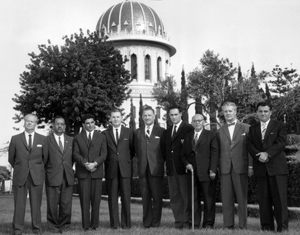
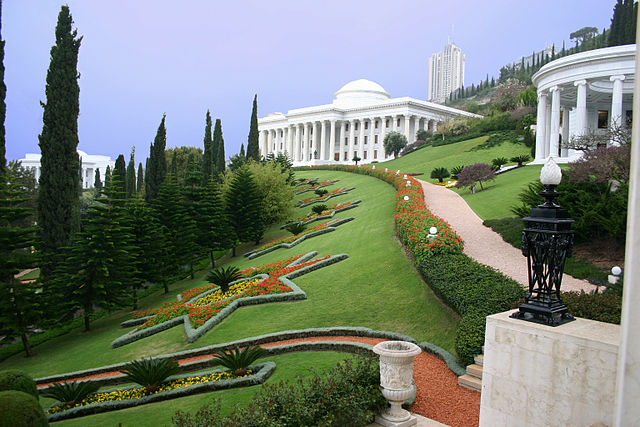 The Universal House of Justice was elected in 1963, as the governing body of the Bahá'i faith. It consists of nine members who are elected every five years. Any male Bahá'i, aged 21 years or more, is eligible for election to the Universal House of Justice. Every year, on April 21, the Universal House of Justice publishes a message to the world-wide Bahá'i community, outlining the current plan of expansion and giving guidelines for the actions of the year to come. Currently, between the years 2001 and 2021, there are successive five-year plans, focussing on classes for children, study circles, and devotional gatherings. Further plans will encourage social action.
The Universal House of Justice was elected in 1963, as the governing body of the Bahá'i faith. It consists of nine members who are elected every five years. Any male Bahá'i, aged 21 years or more, is eligible for election to the Universal House of Justice. Every year, on April 21, the Universal House of Justice publishes a message to the world-wide Bahá'i community, outlining the current plan of expansion and giving guidelines for the actions of the year to come. Currently, between the years 2001 and 2021, there are successive five-year plans, focussing on classes for children, study circles, and devotional gatherings. Further plans will encourage social action.
The Universal House of Justice consults with various organizations associated with the United Nations, such as UNICEF (United Nations Children's Fund), UNEP (United Nations Environment Program) and WHO (World Health Organization).
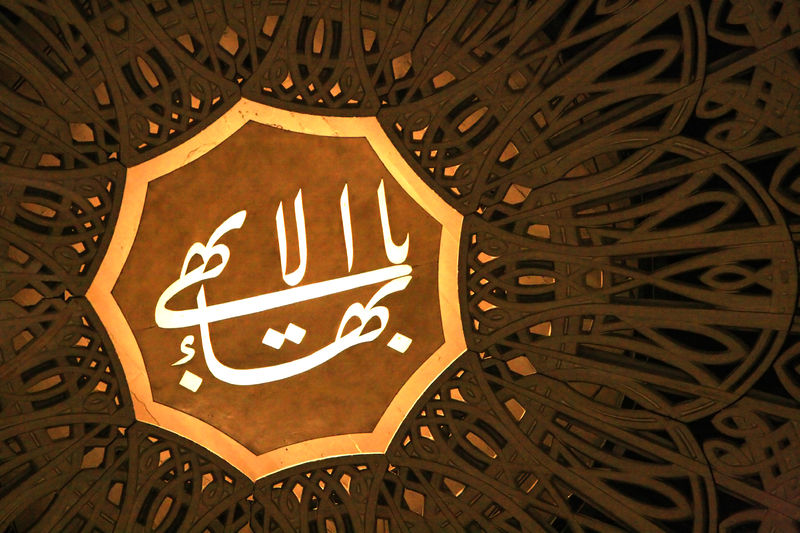
 The main symbol for the Bahá'í religion is the word Bahá' (glory, or splendor) written in Arabic characters, with a nine-pointed star. Or one, or two, five-pointed stars entwined with Bahá' may be used.
The main symbol for the Bahá'í religion is the word Bahá' (glory, or splendor) written in Arabic characters, with a nine-pointed star. Or one, or two, five-pointed stars entwined with Bahá' may be used.
The central beliefs of the Bahá'í faith are the oneness of God, the oneness of humanity, and the common foundation of all religions - or the unity of God, the unity of religion, and the unity of humanity.
Bahá'ís see God as the loving Creator of the Universe, who has provided divine Messengers/Teachers to help people find their way to God.
Bahá'ís believe that there is one God and that all the universe and creation belong to him. God is omnipotent, perfect and has complete knowledge of life. Bahá'ís believe that there has only ever been one God, who is called by different names in different religions.
No-one can truly understand God or comprehend Him - God is too great to be ever understood by the finite human mind. The only thing that humans can understand is what God reveals through his Manifestations (Moses, Jesus, Mohammed, Krishna, etc.)
The only thing we can actually know about God is that God exists.
Bahá'ís also believe in the equality of men and women, universal education, world peace, and the creation of a world federal system of government.
They also believe that all people should be united spiritually, that people have rational souls that live forever, all religions have the same spiritual foundation, and there should be no inequality between races or sexes.
The writings of the Báb and Baha'u'lláh are regarded as Divine Revelation. The writings of `Abdu'l-Bahá and Shoghi Effendi are regarded as authoritative interpretation, and the writings of the Universal House of Justice as authoritative legislation.
Important writings by Baha'u'lláh are the Kitáb-i-Aqdas (The Most Holy Book), which contains his laws, and the Kitáb-i-Iqán (Book of Certitude) which forms the basis of the faith. He also wrote some further laws and mystical books.
Other Scriptures such as the Koran and The Bible are regarded as "Divine Revelations" also, but were written for people of earlier ages.
Moses, Jesus, Krishna, the Buddha, and Mohammed are seen as "Manifestations of God". They all have the same metaphysical nature and the same spiritual stature, and there is absolute equality among them. No one of them is superior to another. The differences in their teachings are seen as being the different messages which people needed to hear at various stages of human history. Teachings by an earlier Manifestation may be revoked by a later Manifestation. For example, dietary laws may be revoked, but general principles such as love and service to humanity, neighborliness, and charity are universal. It is expected that a Manifestation of God will come to humanity about every thousand years, at times of crisis.
Humanity, and religion, is believed to be in a process of evolution, and the present age is leading to a time of peace, justice, and the unity of humanity. The primary issue for the present age is the unification of humanity.
Duties of Bahá'ís :
Every human being has a duty to recognize God through his Manifestations, conform to their teachings, and live a life of prayer, spiritual practice, and service to humanity. In this way the human soul comes closer to God. When a human dies, the soul goes to the next world and is judged according to its spiritual development. Heaven and Hell are not thought of as places of reward or punishment, but as spiritual states of nearness or distance from God.
Bahá'ís over the age of 15 are required to recite a fixed prayer each day, to offer their own devotional prayers, and to study and meditate on their scriptures.
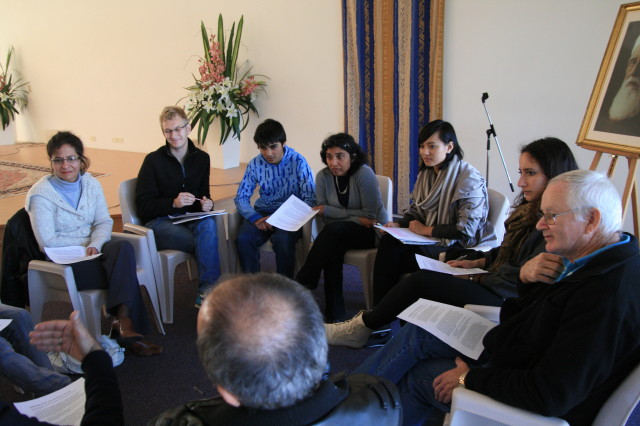 When Bahá'ís gather for religious meetings they may read aloud from books of prayers written by leaders of the Bahá'í faith.
When Bahá'ís gather for religious meetings they may read aloud from books of prayers written by leaders of the Bahá'í faith.
Adult Bahá'ís in good health should observe a sunrise-to-sunset fast for 19 days, from March 2-20.
Backbiting, gossip, and gambling are prohibited, as is sex outside of marriage between husband and wife, and alcohol and drugs, unless prescribed by a doctor.
Fanaticism is forbidden, and using rituals is discouraged. Taking part in partisan politics is also forbidden.
Marriage is seen as an eternal spiritual union which lasts beyond death and into the spiritual world. Bahá'ís may not engage in sexual intercourse outside of marriage. Marriage is for the purpose of spiritual harmony between a man and a woman, and to provide a stable environment for the rearing of children. Bahá'ís may decide for themselves whom they want to marry, but they must obtain the permission of all living biological parents (even if such parents are not Bahá'í). The marriage ceremony is brief - the bride and groom read the wedding vows in the presence of two witnesses. The vows are "We will all, verily, abide by the Will of God."
Marriage to a non-Bahá'í is permitted. Inter-racial marriage is praised in the Bahá'í writings. Divorce is discouraged. Monasticism is prohibited.
Bahá'ís meet in private homes, in local Bahá'í centers, or in rented facilities.
There are also seven Bahá'í Houses of Worship world-wide, with more planned for the future.
The Bahá'í year has 19 months, each with 19 days, with four or five additional (intercalary) days to bring it in line with a solar year. Each month is named after one of the attributes of God. A week consists of 7 days, each named after an attribute of God. The New Year is at the vernal equinox, March 21, and marks the end of the month of fasting. At the start of each month Bahá'ís have a gathering called a Feast, for worship, planning and social activities.
There are 11 Holy Days in the year, commemorating various anniversaries important to the religion. On most of these days no work is to be done.
Persecution of Bahá'ís is still continuing in Islamic countries, where Bahá'ís are regarded as heretics and apostates from Islam. Hundreds of Bahá'ís have been executed in Iran and Egypt, Bahá'í schools were closed by the governing authorities, Bahá'í marriages were not recognized, Bahá'ís were refused admittance to universities, and Bahá'í cemeteries were desecrated. In Iran, Bahá'ís have been imprisoned for taking part in study circles. The House of the Báb, in Shiraz, one of the pilgrimage sites for Bahá'ís, was destroyed twice. Observers for the United Nations Commission on Human Rights have stated that the situation in Iran in regard to religious minorities such as the Bahá'ís is continuing to deteriorate.
In Egypt all Bahá'í activities have been declared illegal, and all Bahá'í property has been confiscated. The government only permits three religions (Muslim, Jewish, and Christian) in Egypt, and all government identification documents must state a person's religion - hence Bahá'ís and members of other religions cannot get ID cards, passports, marriage licenses, birth certificates, etc, and cannot be employed, treated in a hospital, go to school, or vote without lying about their religion - which Bahá'ís will not do. The situation improved slightly in 2009, when the Egyptian government allowed Egyptians who were not members of one of the three permitted religions to put a dash in the place for religion on the ID card.
Principles of Bahá'í
Shogi Effendi wrote the following summary of the principles of Bahá'í :
"The independent search after truth, unfettered by superstition or tradition;
the oneness of the entire human race, the pivotal principle and fundamental doctrine of the Faith;
the basic unity of all religions;
the condemnation of all forms of prejudice, whether religious, racial, class or national;
the harmony which must exist between religion and science;
the equality of men and women, the two wings on which the bird of human kind is able to soar;
the introduction of compulsory education;
the adoption of a universal auxiliary language;
the abolition of the extremes of wealth and poverty;
the institution of a world tribunal for the adjudication of disputes between nations;
the exaltation of work, performed in the spirit of service, to the rank of worship;
the glorification of justice as the ruling principle in human society,
and of religion as a bulwark for the protection of all peoples and nations;
and the establishment of a permanent and universal peace as the supreme goal of all mankind -
these stand out as the essential elements."
Time Line
1817 - Birth of Bahá'u'lláh.
1819 - Birth of the Báb.
1844 - Siyyid `Alí Muhammad Shírází took the name of al-Báb and began to teach that the Bahá'u'lláh was about to appear.
1844 - Mirza Husayn Ali met the Báb for the first time, and became one of his disciples.
1844 - The Báb identified Mirza Husayn Ali as the Bahá'u'lláh - the new prophet.
1850 - The Báb was executed in Tabriz by the Muslim authorities on a charge of heresy.
1852 - Radical Bábís attempted to assassinate the Shah of Persia in retaliation for the execution of the Báb. The assassination attempt failed, and many Bábís were rounded up and killed or imprisoned.
1852 - Bahá'u'lláh was imprisoned on the charge of plotting to assassinate the Shah of Persia.
1853 - Bahá'u'lláh had a vision of the "Most Great Spirit" confirming him in his mission.
1853 - Bahá'u'lláh was released from prison, and sent into exile. He went to Baghdad in Iraq.
1868 - Bahá'u'lláh was banished to Akka, near Haifa.
1892 - Bahá'u'lláh died and was succeeded by his son `Abdu'l-Bahá as leader.
1908 - `Abdu'l-Bahá was released from prison.
1909 - The remains of the Báb were buried in the Tomb of the Báb in Haifa.
1921 - `Abdu'l-Bahá died and leadership was taken by an administrative group headed by his grandson, Shogi Effendi.
1921 - Shogi Effendi was appointed as the first "Guardian of the Faith".
1949 - Construction of the Shrine of the Báb began.
1953 - Construction of the Shrine of the Báb was completed.
1957 - Shogi Effendi died.
1963 - First election of the Universal House of Justice
Copyright © 2015 Shirley J. Rollinson, all Rights Reserved